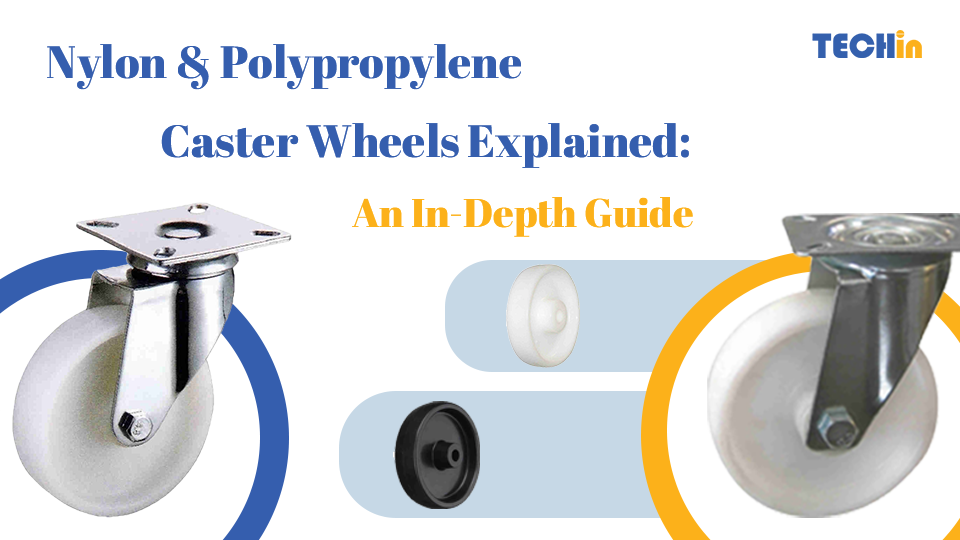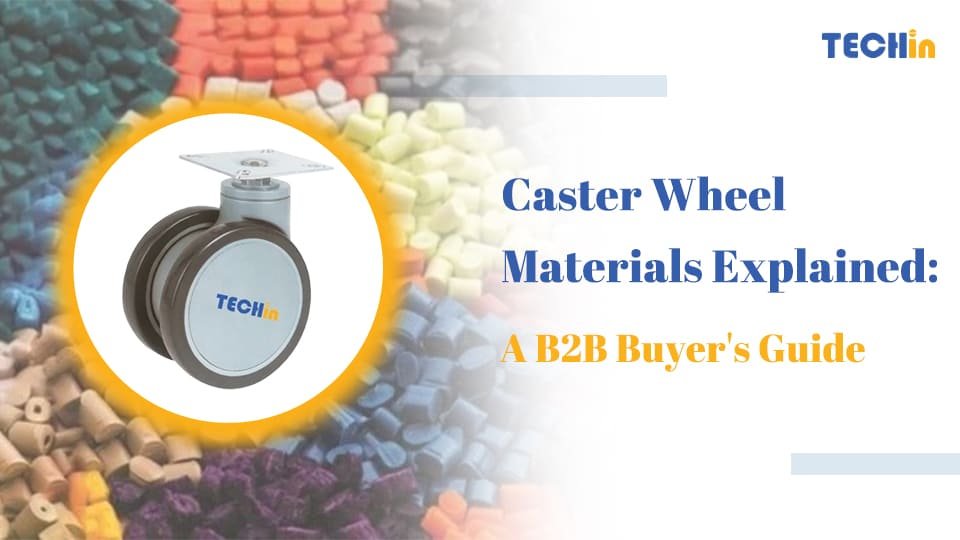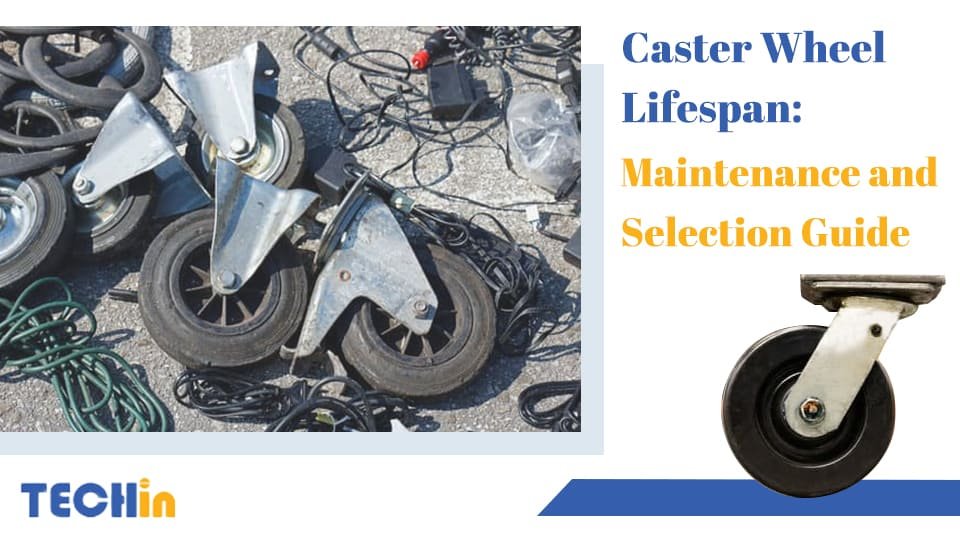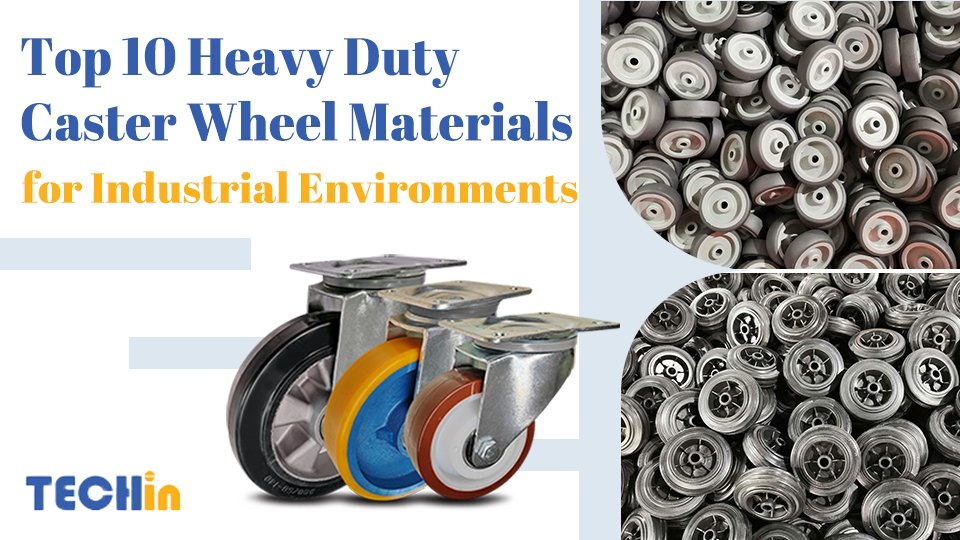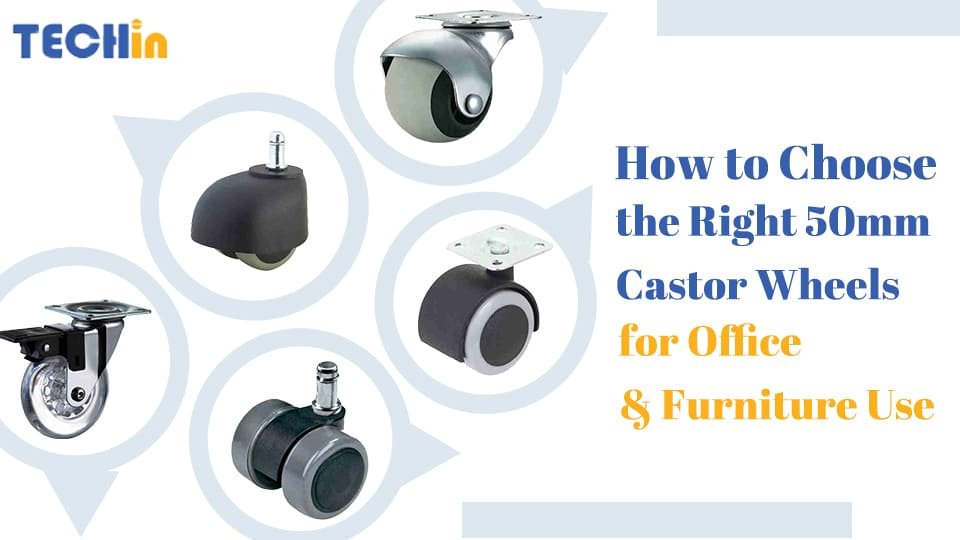Introduction
Choosing the right caster wheel material is a critical decision. The wrong choice can lead to damaged floors, disruptive noise, or unnecessary replacement costs. This guide offers a clear, practical comparison of nylon and polypropylene wheels, so you can select the right product with confidence.
Nylon caster wheels are engineered for strength and durability, making them the go-to for heavy-duty applications. Polypropylene wheels are a lighter, more cost-effective option with excellent resistance to water and chemicals. Ultimately, the best choice depends on your load requirements, work environment, and budget.
Now, let’s take a closer look at both wheel types to understand their advantages, disadvantages, and ideal uses.
What are nylon wheels?
Think of nylon caster wheels as the workhorses of the caster world. They are manufactured from polyamide, a tough engineering plastic renowned for its strength and durability. You’ll typically find these wheels in industrial environments where load capacity and impact resistance are top priorities.
Nylon also handles a wide range of temperatures, making it a dependable choice for food processing plants, bakeries, cold storage facilities, and assembly lines. For procurement managers sourcing industrial castor wheels or heavy-duty swivel caster wheels, nylon offers proven reliability.
What are polypropylene wheels?
Polypropylene caster wheels are made from a lightweight yet rigid plastic. Their standout features are excellent chemical resistance and being fully waterproof. This makes them perfectly suited for environments with frequent exposure to cleaning agents, moisture, or mild chemicals.
These wheels are widely used for supermarket carts, light-duty trolleys, cleaning equipment, and institutional furniture—applications where affordability is often a more significant factor than extreme performance.
What are the advantages and disadvantages of nylon wheels?
Advantages:
- High load capacity – Excellent for supporting heavy machinery and industrial carts.
- Impact resistant – Withstands the demanding conditions of factories and warehouses.
- Temperature resistant – Performs reliably in hot, cold, and fluctuating climates.
- Durable – Offers a long service life, which reduces replacement frequency and long-term costs.
Disadvantages:
- Its hard surface may wear down softer floors over time.
- Generates more rolling noise than softer wheel materials.
- Carries a higher upfront cost compared to polypropylene.
What are the advantages and disadvantages of polypropylene wheels?
Advantages:
- Lightweight and easy to handle.
- Very affordable, making it ideal for cost-sensitive projects.
- Resistant to water and most common cleaning chemicals.
- Performs well on smooth, clean floor surfaces.
Disadvantages:
- Lower load capacity – Not designed for heavy equipment.
- Can become brittle and crack under heavy impact or weight.
- Produces noticeable noise on hard floors.
- Has limited performance capabilities in extreme hot or cold.
What is the difference between nylon and polypropylene caster wheels?
Although both wheels are made from hard plastics, their core characteristics are designed for very different purposes.
Nylon is engineered for performance and durability. It carries higher loads, tolerates extreme temperatures, and resists impact damage. This makes it the preferred choice in factories, warehouses, and logistics centers where equipment is under constant strain.
Polypropylene, by contrast, is best for light-duty, cost-sensitive applications. It performs reliably when exposed to water or cleaning chemicals but is not built for heavy machinery or rough surfaces. Because it is cheaper to manufacture, polypropylene is commonly used for retail carts, supermarket equipment, and light cleaning trolleys.
Here’s a direct comparison:
| Feature | Nylon Wheels | Polypropylene Wheels |
|---|---|---|
| Load Capacity | High – handles heavy loads | Lower – best for light-duty use |
| Durability | Very durable, impact resistant | Less durable, can crack under impact |
| Noise Level | Louder on hard floors | Noisy, especially on uneven floors |
| Floor Protection | Can scuff floors if unprotected | May mark floors, not floor-friendly |
| Chemical Resistance | Good against many chemicals | Excellent, especially water-resistant |
| Temperature | Performs in extreme hot/cold | Limited heat and cold resistance |
| Price | Higher upfront cost | More affordable |
In short: Nylon is the professional-grade choice for heavy-duty industries, while polypropylene is best where cost savings and chemical resistance are more important than load performance.
Are nylon wheels better than polypropylene?
So, which one is actually better? The truth is, neither is “better” in every situation—it all comes down to what you need the wheel to do. Nylon is superior in terms of strength, durability, and long-term performance, which makes it a more reliable investment for demanding industrial projects.
Polypropylene, however, is the clear winner when low cost and chemical resistance are the top priorities. For example:
- A machinery project procurement manager would likely choose nylon to avoid downtime caused by wheel failure.
- A hardware supermarket procurement manager might choose polypropylene wheels for shopping carts, where loads are lighter and cost control is key.
Which caster wheel material is best for industrial applications?
For most industrial applications, nylon wheels remain the clear winner. They provide the necessary strength, temperature resistance, and durability for equipment that must operate reliably under tough conditions.
However, it’s always wise for buyers to consider alternatives for specific needs:
- Rubber caster wheels heavy duty – A better choice for floor protection and noise reduction.
- Polyurethane wheels – A balanced option, offering durability plus floor safety.
- Wide caster wheels – Useful for distributing a heavy load over a larger surface area.
In environments like warehouses, factories, and logistics hubs, nylon wheels are almost always the first recommendation for a reason.
Do polypropylene caster wheels protect floors?
It’s important to know that polypropylene wheels offer minimal floor protection. Their rigid plastic surface can leave scratches or marks, particularly on more delicate flooring like wood, vinyl, or tiles. They are also known for being noisy on concrete or other hard surfaces.
For applications where quiet operation and floor safety are important, you would be better served by rubber or polyurethane caster wheels. Polypropylene is best restricted to smooth, durable floors where cost is the primary deciding factor.
How to choose the right wheel for my business?
To make the right choice for your business, it helps to think strategically about your specific needs. Here’s a step-by-step guide to walk you through the decision:
- Define your load capacity
- If each wheel must carry heavy loads (e.g., machinery, industrial trolleys), nylon is the safe and reliable choice.
- For light carts, racks, or supermarket equipment, polypropylene is often sufficient.
- Evaluate the environment
- Hot or cold conditions? Nylon is far superior.
- Water and chemical exposure? Polypropylene has the edge here.
- Think about flooring and noise
- If protecting delicate floors is a must, neither nylon nor polypropylene is ideal. Instead, consider polyurethane or rubber caster wheels heavy duty.
- Both nylon and polypropylene are noisy on hard floors, though nylon tends to roll more smoothly under heavy weight.
- Balance cost vs. durability
- Nylon costs more upfront but lasts longer in harsh conditions, reducing long-term expenses.
- Polypropylene is cheaper but may require more frequent replacements under heavy use.
- Match to industry needs
- Manufacturing & logistics: Nylon for performance and strength.
- Food service & cleaning: Polypropylene for chemical resistance and low cost.
- Healthcare & hospitality: Polyurethane or rubber for quiet, floor-safe operation.
By weighing these factors, procurement managers and buyers can make a strategic decision instead of simply picking the cheapest option. In the long run, the right wheel improves safety, reduces downtime, and saves money.
Summary
In summary, the choice between nylon and polypropylene comes down to a simple trade-off. Nylon caster wheels offer superior strength and durability for heavy-duty industries, while polypropylene wheels provide an affordable, chemical-resistant solution for lighter tasks. Choose based on your application, environment, and budget—whether you’re sourcing for industrial castor wheels, or lighter duty trolleys. Matching the right wheel to your business needs ensures smoother operations and lower long-term costs.

